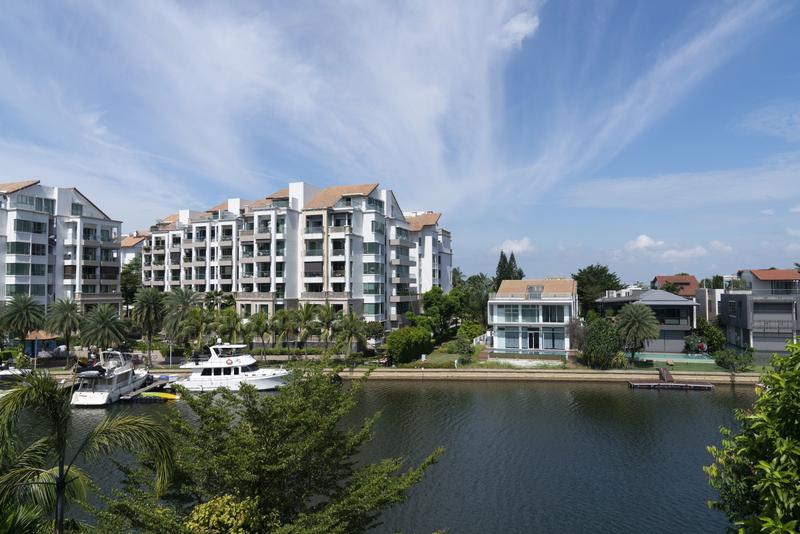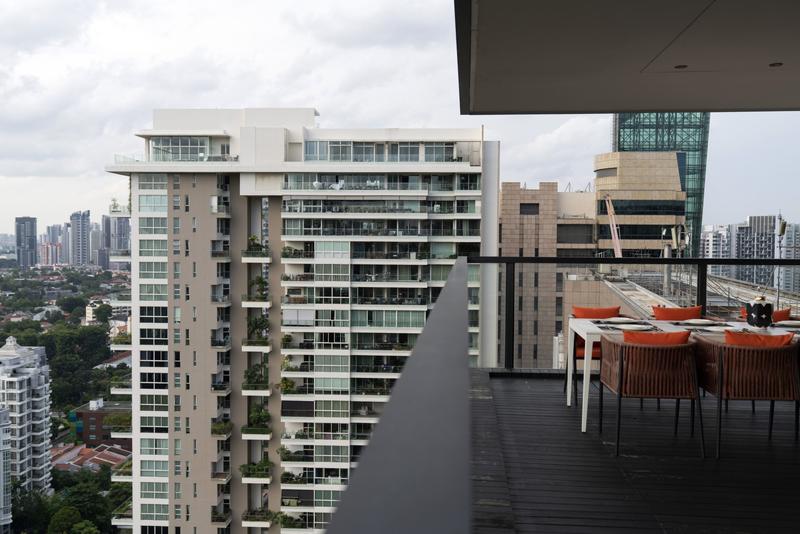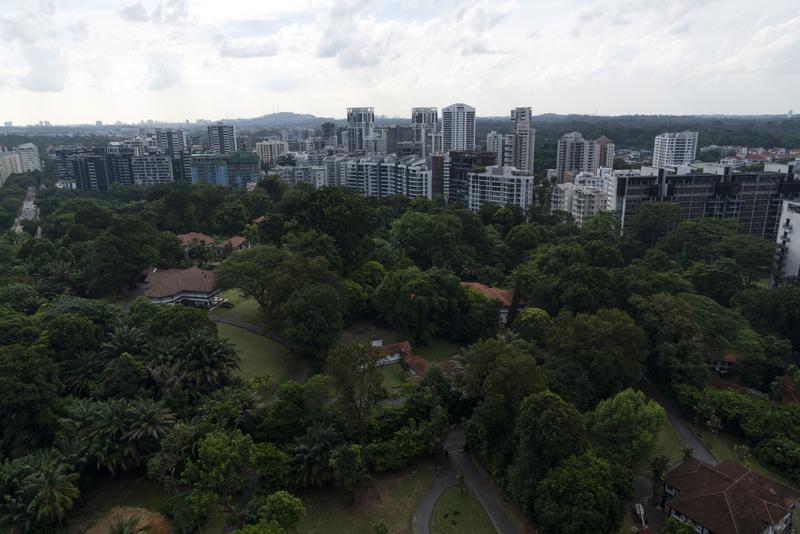 This photo shows the view from a waterfront home in the North Cove of Sentosa Cove in Singapore on Aug 5, 2021. (PHOTO / BLOOMBERG)
This photo shows the view from a waterfront home in the North Cove of Sentosa Cove in Singapore on Aug 5, 2021. (PHOTO / BLOOMBERG)
In an exclusive Singapore neighborhood shaded with rain trees, a local tech billionaire plunked down US$95 million for a mansion. Near an upscale shopping district, a family with a grocery empire spent US$216 million for all the units in a condominium development.
That’s the kind of money sloshing around Singapore’s red-hot residential market this year. To be exact: S$32.9 billion (US$24 billion) spent in the first half alone - the city’s biggest frenzy in more than a decade and double what was recorded in Manhattan over the same six months.
Singapore’s home prices jumped by a record 4.1 percent in the first half as tycoons across Asia seek a safe harbor. Some are shifting funds from economies hammered by the pandemic or political turmoil
With inflation on many minds, the ultra-rich are stuffing cash into luxury properties around the globe, and in few places is the trend as apparent as in Singapore.
The city’s home prices jumped by a record 4.1 percent in the first half as tycoons across Asia seek a safe harbor. Some are shifting funds from economies hammered by the pandemic or political turmoil.
The boom in Singapore is reminiscent of 2007, when “well-heeled foreigners were lured by the glamor promised by two upcoming resorts and casinos,” said Nicholas Mak, head of research and consultancy at APAC Realty Ltd unit ERA. That flurry was tamed by the global financial crisis and property curbs. “The difference now is that there are more newly minted ultra-rich people.”
Frenetic buying
When Shun Tak Holdings unveiled its first residential project, Park Nova wasn’t just a showcase of the 54 luxury apartments. It was a display of buyers’ wealth as Rolls-Royce Cullinan and Ferarris descended upon the site, 10 minutes by foot from Singapore’s famous shopping belt Orchard Road.
Sales of bungalows - the equivalent of mansions and the creme de la creme of housing that can only be purchased by citizens and some permanent residents on a case by case basis - surged by 83 percent to over S$1.5 billion in the first half compared with a year ago
All three penthouses were snapped up, fetching prices of as much as S$34.4 million. “For rich people, such prices aren’t a concern. If it’s a good buy, they would want it,” Lee said, adding that the buyers were both local and foreign.
Sales of bungalows - the equivalent of mansions and the creme de la creme of housing that can only be purchased by citizens and some permanent residents on a case by case basis - surged by 83 percent to over S$1.5 billion in the first half compared with a year ago. That’s also 79 percent higher than the pre-pandemic sales in 2019.
In the city’s prestigious Sentosa Cove, where massive houses on the waterfront boast private berths for yachts, transactions tripled to S$190.7 million in the first half, compared with the same period a year ago, according to data from List Sotheby’s International Realty.
ALSO READ: Singapore maintains 2021 GDP outlook despite virus setback
Prices in the neighborhood - the only area where foreigners are allowed to purchase luxurious bungalows - also jumped 7 percent last year, said Lewis Cha, executive director at Sotheby’s International Realty.
 Luxury condominium across from the outdoor dining area of the show flat at the Reignwood Hamilton Scotts luxury apartment building on Scotts Road in Singapore, on Aug 5, 2021. (PHOTO / BLOOMBERG)
Luxury condominium across from the outdoor dining area of the show flat at the Reignwood Hamilton Scotts luxury apartment building on Scotts Road in Singapore, on Aug 5, 2021. (PHOTO / BLOOMBERG)
“Some of the buyers decided to move out of their rental apartments for a more permanent home while others decided that Singapore is a safe haven to park their funds,” Cha added.
Buyers’ confidentiality
Buyers use trusts to conceal their identities from the public and even the government. For instance, banks can register themselves as the legal owner on behalf of the individuals
Buyers use trusts to conceal their identities from the public and even the government. For instance, banks can register themselves as the legal owner on behalf of the individuals. It complicates the burden on developers to screen prospective buyers for money laundering risks.
The city-state is reviewing existing laws to further strengthen requirements for developers to guard against money laundering activities in the sale and purchase of uncompleted private properties, a spokesperson of the Urban Redevelopment Authority said in a response to Bloomberg’s query.
ALSO READ: Singapore's hot housing market faces risk of cooling curbs
Soaring prices have fueled speculation that authorities may impose curbs to cool the market, which last happened in 2018. Those concerns were allayed when the central bank said the property market wasn’t overheated, suggesting the government wouldn’t be making moves anytime soon.
 A view of condominiums and black and white colonial era houses, managed by the Singapore Land Authority, from the show flat at the Reignwood Hamilton Scotts luxury apartment building on Scotts Road in Singapore, on Aug 5, 2021. (PHOTO / BLOOMBERG)
A view of condominiums and black and white colonial era houses, managed by the Singapore Land Authority, from the show flat at the Reignwood Hamilton Scotts luxury apartment building on Scotts Road in Singapore, on Aug 5, 2021. (PHOTO / BLOOMBERG)
Cooling measures
Still officials have good reasons to be vigilant. More people are looking to upgrade from public to private units to show they’re moving up the social mobility ladder. If those buyers are priced out, it may become a political test for the ruling People’s Action Party, which is already under scrutiny after suffering its worst parliamentary results last July.
Ravi Menon, managing director of the Monetary Authority of Singapore, said in June that a prolonged divergence between prices and income is unsustainable and undesirable.
“If unresolved, this could lead to questions of a greater inequality gap and what the government is looking to do to reduce this,” said Nydia Ngiow, the Singapore-based senior director at BowerGroupAsia, a strategic policy advisory firm.
READ MORE: From Singapore to Rio, green blocks keep tropical tenants cool
Barring any market shocks such as property curbs, however, Singapore’s housing frenzy is set to continue. “The market appears to be going on a Poseidon Adventure, sailing into a tsunami,” said Alan Cheong, executive director of research at Savills Plc. “The tsunami turns out to be the liquidity that is keeping the market afloat.
“Hence, rather than capsizing, the party could continue.”


